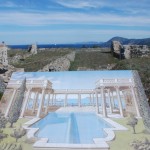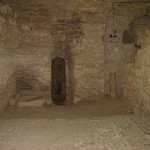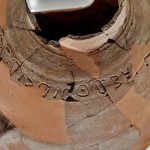Biblical King Herrod’s Palace Entrance Unearthed
Excavations of a colossal fortress built by King Herod the Great have uncovered the palace’s dramatic entrance way.
The arched entrance and corridor, built around 20 years before the birth of Christ, leads to a vestibule or lobby covered with coloured frescoes.
The palace was built after Herod defeated the Parthians, originally from Iran, and decided to build a town and palace on the site 10 miles (16km) south of Jerusalem to celebrate his victory.
The discovery was made by by the Hebrew University of Jerusalem’s Institute of Archaeology.
It was part of a wider dig that is ongoing at the Herodium site in the Herodyon National Park.
The main feature of the entryway is a corridor with a complex system of arches spanning its width on three separate levels.
Thanks to the supporting arches, the 65ft (20 metre) long and 19ft (6 metre) wide corridor has been preserved to a height of 65ft (20 metres).
Hebrew University archaeologists, Roi Porat, Yakov Kalman and Rachel Chachy, said: ‘The corridor was built as part of Herod’s plan to turn Herodium into a massive artificial volcano-shaped hill, a vast and impressive monument designed to commemorate the architect-King.
Herod (/ˈhɛrəd/; Hebrew: הוֹרְדוֹס, Hordus, Greek: Ἡρῴδης, Hērōdēs; 74/73 BCE – 4 BCE), also known as Herod the Great and Herod I, was a Roman client kingof Judea, referred to as the Herodian kingdom. He has been described as “a madman who murdered his own family and a great many rabbis“, “the evil genius of the Judean nation”, “prepared to commit any crime in order to gratify his unbounded ambition” and “the greatest builder in Jewish history”. He is known for his colossal building projects throughout Judea, including his expansion of the Second Temple in Jerusalem (Herod’s Temple), the construction of the port at Caesarea Maritima, the fortress at Masada and Herodium. Vital details of his life are recorded in the works of the 1st century CE Roman–Jewish historian Josephus.
Upon Herod’s death, the Romans divided his kingdom among three of his sons—Archelaus became ethnarch of the tetrarchy of Judea, Herod Antipas became tetrarch ofGalilee and Peraea, and Philip became tetrarch of territories east of the Jordan.







